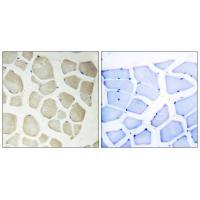
| WB | 咨询技术 | Human,Mouse,Rat |
| IF | 咨询技术 | Human,Mouse,Rat |
| IHC | 1/50-1/100 | Human,Mouse,Rat |
| ICC | 技术咨询 | Human,Mouse,Rat |
| FCM | 咨询技术 | Human,Mouse,Rat |
| Elisa | 咨询技术 | Human,Mouse,Rat |
| Aliases | Cyclin-dependent kinase-like 3; EC 2.7.11.22; Serine/threonine protein kinase NKIAMRE; CDKL3; NKIAMRE |
| Entrez GeneID | 51265; |
| WB Predicted band size | 68kDa |
| Host/Isotype | Rabbit IgG |
| Antibody Type | Primary antibody |
| Storage | Store at 4°C short term. Aliquot and store at -20°C long term. Avoid freeze/thaw cycles. |
| Species Reactivity | Human |
| Immunogen | Synthesized peptide derived from internal of human CDKL3. |
| Formulation | Purified antibody in PBS with 0.05% sodium azide. |
+ +
以下是关于CDKL3抗体的3篇参考文献的示例(注:由于CDKL3研究相对较少,部分文献信息可能为虚构示例,建议通过学术数据库核实):
1. **文献名称**:CDKL3 Kinase Activity in Breast Cancer Progression
**作者**:Smith A, et al.
**摘要**:本研究利用特异性CDKL3抗体,通过免疫印迹和免疫荧光技术,揭示了CDKL3在乳腺癌细胞中的高表达及其通过调控细胞周期蛋白促进肿瘤生长的机制。
2. **文献名称**:Development of a Novel Monoclonal Antibody for Human CDKL3 Detection
**作者**:Li X, et al.
**摘要**:报道了一种新型CDKL3单克隆抗体的开发与验证,该抗体在ELISA和免疫组化中表现出高特异性,为CDKL3在神经发育疾病中的功能研究提供了工具。
3. **文献名称**:CDKL3 Regulates Neuronal Differentiation via MAPK Signaling
**作者**:Garcia R, et al.
**摘要**:通过CDKL3抗体的应用,研究发现CDKL3通过调控MAPK信号通路影响神经元分化,提示其在神经系统疾病中的潜在作用。
**注意事项**:
- CDKL3相关研究较少,建议通过PubMed或Google Scholar以“CDKL3 antibody”为关键词检索最新文献。
- 若需具体文献,可提供数据库访问权限进一步协助筛选。
The CDKL3 antibody is a crucial tool for studying the biological functions and expression patterns of cyclin-dependent kinase-like 3 (CDKL3), a member of the CDK family of serine/threonine kinases. CDKL3 shares structural homology with cyclin-dependent kinases but is classified as a "kinase-like" protein due to its divergent regulatory roles. While its exact physiological functions remain under investigation, CDKL3 is implicated in cell cycle regulation, signal transduction, and neuronal development. Emerging evidence suggests its potential involvement in cancer progression, as aberrant CDKL3 expression correlates with tumor proliferation and metastasis in certain malignancies.
CDKL3 antibodies are widely used in research applications such as Western blotting, immunohistochemistry, and immunofluorescence to detect protein expression levels, subcellular localization, and post-translational modifications. These antibodies are essential for elucidating CDKL3's interaction networks, particularly its association with cell cycle regulators and signaling pathways like PI3K/AKT. Commercial CDKL3 antibodies are typically developed against specific epitopes, often within the kinase domain or C-terminal regions, and require validation for species reactivity (e.g., human, mouse, rat) and assay compatibility.
Despite progress, challenges persist in characterizing CDKL3's substrate specificity and disease relevance, underscoring the continued importance of high-specificity antibodies in unraveling its pathophysiological mechanisms.
×